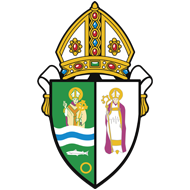St John 1.14: and the Word became flesh and dwelt among us …
 We’re all familiar with slogans, mottoes, catchphrases, strap lines, by which institutions or political parties or campaigning groups like to promote themselves, their claims, their values among the rest of us. Some of them may strike us as important and even challenging – I certainly, for example, find that to be true of Christian Aid’s strap line, we believe in life before death. And I’ve always loved the motto of the University of Oxford, where I studied for my degree in theology: Dominus illuminatio mea, the Lord is my light.
We’re all familiar with slogans, mottoes, catchphrases, strap lines, by which institutions or political parties or campaigning groups like to promote themselves, their claims, their values among the rest of us. Some of them may strike us as important and even challenging – I certainly, for example, find that to be true of Christian Aid’s strap line, we believe in life before death. And I’ve always loved the motto of the University of Oxford, where I studied for my degree in theology: Dominus illuminatio mea, the Lord is my light.
Well, I think that the word flesh was a kind of strapline for the Christian communities among which the Gospel of St John came to be written, say, in the second half of the first century CE. The most celebrated use of it we hear proclaimed in the gospel every year at Midnight Mass: the Word became flesh and dwelt among us. But we also find it in the letters of St John, closely related to the Gospel, where it is said that true believers always confess that Jesus Christ came in the flesh. Indeed so important was this little word flesh to these Johannine Christians that they went so far as to claim that those who would not say that Jesus came in the flesh were Antichrist, just about the worst thing you could say about anyone, from a Christian point of view, right up to the present day.
The thing is, though, that this coming in the flesh isn’t just important to St John’s Christian communities. It’s not just a matter of what they thought all those centuries ago. Not at all. It has remained of absolutely fundamental importance to all Christian people ever since and is at the very heart of our Christmas celebrations, every year, which is why traditionally the reader of the gospel makes a deep blow at these words and why people used to kneel for the words and was made man in the Creed. Really, Christmas simply isn’t conceivable, isn’t possible without St John’s joyous affirmation that God the Word became flesh and dwelt among us.
Why is that so? Why should such a small word matter so very much? Well, for St John and his communities of Christians flesh was important because it meant to them our human life, so that when he says that God becomes flesh he wants us to understand that in Jesus Christ God lives out our human life from the inside. We call this the Incarnation, God with a skin if you like, and it’s what Christmas is all about. God so loves us, so wants us to make the most of the lives given us, by drawing us to God’s own life, that it is a case of becoming God with us, God one of us, flesh of our flesh and bone of our bone. God wants to be as close to us as possible and that means beginning life as we do, utterly dependent on other people. Not God commanding us from afar with overwhelming power, but in our midst loving us in the weakness and vulnerability of a human child. This is how much God loves us fleshly human beings and, as the divine life among us unfolds, we know the cost of that love, the height, the depth, the self-giving of that love.
As we celebrate once more that immense love God has for us and for the whole world, we must know ourselves called to love God in return. And a big part of that is to love ourselves and all around us as we are loved by God, to love ourselves and those around us because we are all loved so much by God and so precious to God.
This we are called to do in and for a world that can often seem very far away from love, life and hope. We see so much hatred, so much holding of human life not as precious but as cheap and insignificant, so much torn and wounded and abused flesh, so many shattered lives, so much cruelty, so much indifference to suffering, so much pitiless killing of the innocent. Christmas is not about escaping from all of that. Apart from anything else it is all anyhow embedded in our Christmas celebration as it unfolds – after all, on the second day of Christmas we find ourselves commemorating the terrible stoning to death of St Stephen and then two days later the slaughter of the children of Bethlehem at Herod’s command.
The thing is, of course, that the Word made flesh, Jesus himself, from the very start of his life among us, as his family fled for their lives as refugees into Egypt, faced in the world he loved the same lovelessness and cruelty that we face. He knows what that’s like and He is with us in our Christmas celebration and throughout our lives to encourage us always to keep faith, to hold to love, and goodness and truth and beauty, to hold to God’s vision of the preciousness of all God’s children, whose flesh God shares, whose lives God cherishes and whose love God desires, always and for ever.
I wish you all a very happy and blessed Christmas.
+Gregor

